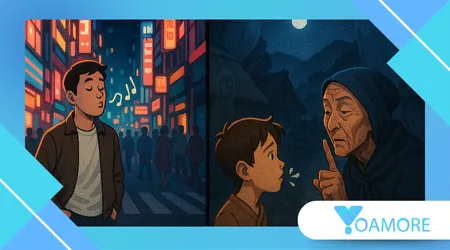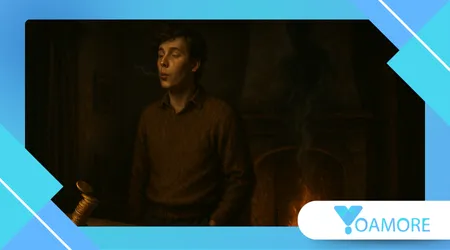Assobiar à noite? Em alguns países, isso atrai espíritos.

Tenha cuidado onde você assobia depois do pôr do sol, pois o antigo e persistente superstição de assobiar à noite Ainda influencia o comportamento em muitas culturas.
Anúncios
Isso não é apenas um eco de histórias antigas, mas um princípio ativo que molda as noites de milhões de pessoas ao redor do mundo.
Você está prestes a desvendar a verdade por trás deste mistério global, que é mais complexo e fascinante do que a simples crença no azar. Prepare-se para uma profunda jornada cultural que exigirá toda a sua atenção.
🌎 O que é a superstição do assobio noturno e por que ela é global?
Muitos consideram assobiar um ato simples, uma expressão inofensiva de alegria, mas para inúmeras comunidades, especialmente após o pôr do sol, transforma-se num convite imprudente.
O superstição de assobiar à noite Acredita-se que produzir um som agudo e musical durante a noite atrai entidades sobrenaturais. Você pode estar convidando fantasmas, demônios ou até mesmo o próprio Diabo.
Anúncios
Essa proibição não é uniforme; ela se manifesta com variações regionais únicas que refletem o folclore e a história local de cada lugar. No México, por exemplo, o som pode evocar o Lechuza, uma bruxa metamorfa que se transforma em coruja para capturar o assobiador.
A prevalência global dessa crença sugere raízes profundas na experiência humana, que vão além de meras lendas isoladas.
O medo compartilhado do desconhecido na escuridão, onde os sentidos humanos são menos confiáveis, cria um terreno fértil para proibições.
Historicamente, as noites eram mais perigosas, repletas não só de predadores, mas também da ansiedade humana. Portanto, um som penetrante e alto era visto como uma ruptura da ordem natural, podendo atrair algo que deveria permanecer nas sombras.
O Poder do Vermelho: Como as Cores Protegem e Atraem em Diferentes Culturas
👻 Quais culturas levam a superstição mais a sério?
É impressionante como a mesma proibição ressoa por continentes inteiros, cada um adaptando o aviso aos seus próprios seres míticos.
A superstição de assobiar no escuro é particularmente forte em diversas regiões da Ásia, da América Latina e entre várias culturas indígenas. Cada local oferece uma camada única de significado.
Na Coreia e na China, assobiar à noite é amplamente considerado um chamado direto a fantasmas errantes, que podem então segui-lo até em casa.
Os japoneses, por sua vez, temem que a prática possa atrair não apenas tengu demônios, mas também ladrões e cobras venenosas. É evidente que as consequências temidas abrangem tanto o plano espiritual quanto o mundano, constituindo um aviso abrangente de perigo.
Os turcos acreditam firmemente que assobiar após o anoitecer invoca o Diabo, uma figura central em seu folclore. Os árabes, por sua vez, alertam que tal ato imprudente pode atrair... gênios, ou até mesmo o terrível Sheytan (Satanás). Claramente, o assobio é visto como um ímã sonoro para as forças mais obscuras.
A Tabela 1 oferece uma visão resumida, porém impactante, das associações espirituais mais comuns em diversas regiões que aderem ao superstição de assobiar à noite:
| Região/País | Entidade Sobrenatural Invocada | Principal consequência temida |
| México | O Lechuza (Coruja-Bruxa) | Sequestro ou lesão corporal |
| Peru | O Diabo/Satanás | Invocação de forças demoníacas |
| China/Coreia | Fantasmas Errantes | Atração de espíritos para o lar |
| Havaí (Nativo) | Hukai'po (Marcha Noturna) | Encontro fatal com guerreiros ancestrais |
| Japão | Tengu (Demônios/Ladrões/Cobras) | Risco de roubo ou ataque de animais selvagens |
| Samoa/Tonga | Espíritos indesejáveis | Visitação por entidades malévolas |
💭 Por que assobiar dentro de casa também é desaconselhável?
Surpreendentemente, a restrição não se limita ao exterior; muitas culturas estendem a proibição a assobiar dentro de casa, embora por razões ligeiramente diferentes. Em muitos países eslavos e na Rússia, o ditado popular sugere que assobiar dentro de casa fará com que você "afaste seu dinheiro com assobios", atraindo a pobreza.
Essa variação demonstra que as superstições funcionam como mecanismos de controle social, incentivando o silêncio e o respeito pelo espaço doméstico.
Nos países bálticos e na Escandinávia, alguns acreditam que assobiar dentro de casa pode trazer azar ou até mesmo provocar um incêndio. Esses avisos frequentemente associam a prosperidade financeira e a segurança do lar à conduta pessoal.
O ato de assobiar é inerentemente alto e estridente, uma clara perturbação da paz e da ordem esperadas na residência após o crepúsculo.
Portanto, o silêncio noturno é valorizado não apenas como sinal de respeito, mas também como uma proteção contra o infortúnio. Assobiar é visto como uma forma de desrespeito ou negligência, atraindo má sorte.
Por que as pessoas batem na madeira? As origens de uma superstição global.
🧠 Como a psicologia e a história explicam a persistência dessa crença?

Para o olhar moderno e cético, o superstição de assobiar à noite Pode parecer ridículo, mas sua persistência reside em fatores históricos e psicológicos muito reais. Antropologicamente, a escuridão sempre representou um risco maior, onde predadores e inimigos humanos rondavam.
Assobiar era um meio de comunicação, mas também um ato que revelava sua posição, tornando-o perigoso.
A teoria de que "assobiar atrai predadores" é uma explicação plausível, especialmente em culturas mais rurais, onde o som poderia imitar cantos de pássaros ou vocalizações de animais.
O que era um aviso prático contra animais ferozes ou invasores evoluiu gradualmente para um aviso espiritual contra demônios e fantasmas. Essa transição do perigo físico para o metafísico é comum no desenvolvimento do folclore.
De uma perspectiva psicológica, as superstições oferecem uma sensação de controle em um mundo caótico e imprevisível.
Ao proibir um ato simples como assobiar, os indivíduos sentem que podem influenciar a sua sorte e evitar o infortúnio. O respeito por essas regras não escritas é uma forma de coesão social, um laço silencioso que mantém a comunidade numa sensação de harmonia e segurança.
🦉 Por que a superstição continua relevante em 2025?
Estamos em 2025, a era dos satélites e da inteligência artificial, mas essas crenças não desapareceram; elas simplesmente se adaptaram à vida moderna.
Em muitas partes da Ásia, da América do Sul e entre comunidades indígenas, o alerta ainda é transmitido de geração em geração com grande seriedade. superstição de assobiar à noite Não é uma relíquia, mas sim uma parte viva da identidade cultural.
O surgimento das redes sociais e da internet deu novo fôlego a essas lendas, com histórias assustadoras e relatos pessoais de encontros noturnos se espalhando rapidamente.
Essa partilha global reforça o medo, unindo pessoas de diferentes culturas sob o mesmo tabu sonoro. O poder da crença coletiva é um fator que desafia a lógica racional.
Um estudo recente de 2024 sobre crenças supersticiosas na população urbana do Paquistão, publicado em ResearchGateIsso sugere que, mesmo entre os mais instruídos, as superstições persistem, muitas vezes impulsionadas por experiências pessoais ou histórias familiares.
Isso demonstra que a lógica não se sobrepõe à necessidade psicológica de seguir os costumes ancestrais. Para aprofundar essa resiliência cultural, você pode consultar análises sobre o papel das superstições nas sociedades modernas. Leia sobre a Era da Informação e as Superstições Inatas. Para entender como a sobrecarga de dados alimenta nossas crenças.
⚠️ A Lição do Respeito Cultural: Um Alerta para Viajantes
Se você é um viajante ou um imigrante, entender o superstição de assobiar à noite Não é apenas fascinante — é crucial para a etiqueta cultural.
Assobiar alegremente tarde da noite em Tóquio, numa aldeia Māori ou num bairro de Istambul pode ser percebido não só como rude, mas também como profundamente ofensivo. Em algumas culturas, isso é visto como um ato de arrogância ou ignorância.
Respeitar a tranquilidade da noite e o folclore local é um sinal de boa vontade e inteligência social. Não se trata de acreditar ou não em espíritos, mas sim de honrar a visão de mundo daqueles que o acolhem. Ao evitar assobiar no escuro, você está implicitamente reconhecendo a história e as crenças daquele lugar.
Muitas comunidades veem o mundo como um lugar povoado por espíritos e energias que exigem cautela e reverência, e o silêncio noturno é uma forma de cortesia espiritual. Viajar com essa consciência transforma uma simples viagem em uma experiência de imersão e compreensão mútua. Aja com responsabilidade e em silêncio.
++Como as civilizações antigas explicavam os desastres naturais
❓ Perguntas frequentes (FAQ)
Assobiar à noite é proibido em todas as culturas?
Não, o tabu contra assobiar no escuro não é universal, mas está presente em um número surpreendentemente grande de culturas ao redor do mundo. É particularmente comum em países do Leste Asiático, Sudeste Asiático, América Latina e entre diversas comunidades indígenas.
Existe alguma base científica para o risco de assobiar à noite?
Não há evidências científicas que liguem o assobio à atração de espíritos ou ao azar. As explicações mais racionais sugerem que a proibição pode ter se originado de preocupações práticas, como atrair animais selvagens ou intrusos humanos devido ao ruído.
O que devo fazer se ouvir um assobio à noite em um país que tem essa superstição?
Muitas tradições populares aconselham simplesmente ignorar o som e não tentar assobiar de volta. Recomenda-se permanecer em silêncio e calmo, pois interagir com o som pode ser interpretado como uma resposta ao chamado do espírito, dependendo da crença local.
Assobiar no teatro tem alguma relação com a superstição de assobiar à noite?
Sim, existe uma antiga superstição teatral que proíbe assobiar nos bastidores. Embora seja uma crença à parte, ela tem uma origem prática. Antigamente, os técnicos de palco, muitas vezes ex-marinheiros, usavam apitos para dar sinais. Um assobio aleatório poderia gerar um sinal falso, causando acidentes ou danos ao cenário.
✨ Conclusão: Respeitando a Melodia da História
Você viu que o simples ato de assobiar, aquela melodia casual que surge da alegria ou do tédio, pode carregar um imenso peso cultural.
A persistência do superstição de assobiar à noite Não se trata de uma falha da modernidade, mas sim de uma homenagem à riqueza da história humana e à resiliência do folclore.
As crenças ancestrais continuam a influenciar e orientar a conduta, servindo como um lembrete constante de que o mundo visível é apenas uma parte da realidade para muitos.
Portanto, da próxima vez que você sentir vontade de assobiar depois do pôr do sol, lembre-se do Lechuza, os fantasmas coreanos e o diabo turco. O silêncio, muitas vezes, é a sua melhor música.
Para explorar o vasto alcance dessa lenda em diversas culturas, Descubra o alcance global e histórico da proibição de assobiar. e suas raízes, da China à Nova Zelândia.
